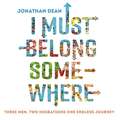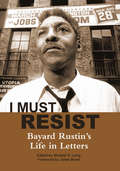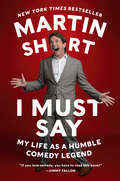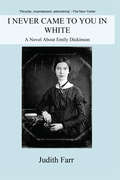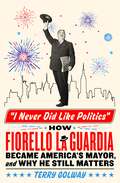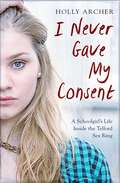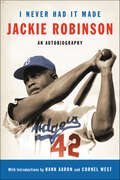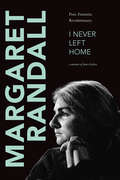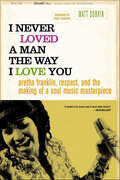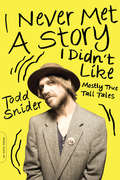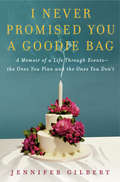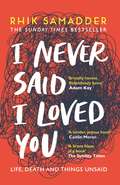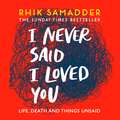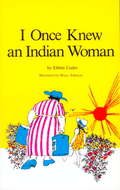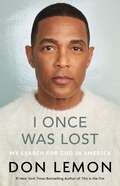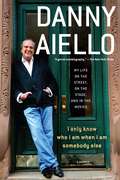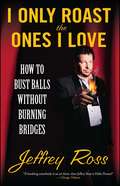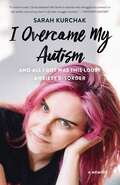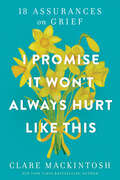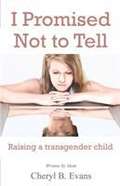- Table View
- List View
I Must Belong Somewhere: Three men. Two migrations. One endless journey.
by Jonathan DeanJonathan Dean's great-grandfather, David Schapira, lived a life of epic achievement and epic suffering. Forced to flee Ukraine at the outbreak of World War I, he was blinded fighting for his adopted country then survived - just - the concentration camp that country later sent him to. In between he found love and laughter in Vienna, and became the first Austrian lawyer to train using braille - something no Briton would do until the new century dawned. Dean's grandfather, Heinz Schapira, was also a refugee. Aged 16, he said goodbye to his parents and embarked on a nail-biting journey to Britain, to escape his fate as an Austrian Jew. The prejudice he faced and assimilation he achieved are laid out in the pages of his diary, pages filled with pain and joy, surprising observations and irrepressible humour. But this is no ordinary family history. As Dean visits the places which changed the course of his family tree - Vienna, Cologne, Ukraine - he finds history repeating itself. He talks to refugees from the Middle East, people who left their homes and families at the same age as David and Heinz. And he observes the warning signs: the bigoted excesses of Brexit Britain, the rise of the Far Right in Austria, the backlash against refugees in Germany. By viewing these contemporary experiences through the prism of his family history - and vice versa - Dean creates an impassioned, profoundly timely study of what it means to be a refugee, to be European and, ultimately, to be British.Read by Joe Jameson(p) 2017 Orion Publishing Group
I Must Resist: Bayard Rustin's Life in Letters
by Julian Bond Michael G. Long Bayard RustinPublished on the centennial of his birth, and in anticipation of the 50th anniversary of the historic March on Washington, here is Bayard Rustin's life story told in his own words.<P> Bayard Rustin has been called the "lost prophet" of the civil rights movement. A master strategist and tireless activist, he is best remembered as the organizer of the 1963 March on Washington, one of the largest nonviolent protests ever held in the U.S. He brought Gandhi's protest techniques to the American civil rights movement and played a deeply influential role in the life of Martin Luther King, Jr., helping to mold him into an international symbol of nonviolence.<P> Despite these achievements, Rustin often remained in the background. He was silenced, threatened, arrested, beaten, imprisoned and fired from important leadership positions, largely because he was an openly gay man in a fiercely homophobic era.<P> Here we have Rustin in his own words in a collection of over 150 of his letters; his correspondents include the major progressives of his day -- for example, Eleanor Holmes Norton, A. Philip Randolph, Roy Wilkins, Ella Baker, and of course, Martin Luther King, Jr.Bayard Rustin's eloquent, impassioned voice, his ability to chart the path "from protest to politics," is both timely and deeply informative. As the Occupy movement ushers America into a pivotal election year, and as politicians and citizens re-assess their goals and strategies, these letters provide direct access to the strategic thinking and tactical planning that led to the successes of one of America's most transformative and historic social movements.
I Must Say
by Martin ShortIn this engagingly witty, wise, and heartfelt memoir, Martin Short tells the tale of how a showbiz obsessed kid from Canada transformed himself into one of Hollywood's favorite funnymen, known to his famous peers as the "comedian's comedian."Short takes the reader on a rich, hilarious, and occasionally heartbreaking ride through his life and times, from his early years in Toronto as a member of the fabled improvisational troupe Second City to the all-American comic big time of Saturday Night Live, and from memorable roles in such movies as ¡Three Amigos! and Father of the Bride to Broadway stardom in Fame Becomes Me and the Tony-winning Little Me.He reveals how he created his most indelible comedic characters, among them the manic man-child Ed Grimley, the slimy corporate lawyer Nathan Thurm, and the bizarrely insensitive interviewer Jiminy Glick. Throughout, Short freely shares the spotlight with friends, colleagues, and collaborators, among them Steve Martin, Tom Hanks, Gilda Radner, Mel Brooks, Nora Ephron, Eugene Levy, Catherine O'Hara, Paul Shaffer, and David Letterman.But there is another side to Short's life that he has long kept private. He lost his eldest brother and both parents by the time he turned twenty, and, more recently, he lost his wife of thirty years to cancer. In I Must Say, Short talks for the first time about the pain that these losses inflicted and the upbeat life philosophy that has kept him resilient and carried him through.In the grand tradition of comedy legends, Martin Short offers a show-business memoir densely populated with boldface names and rife with retellable tales: a hugely entertaining yet surprisingly moving self-portrait that will keep you laughing--and crying--from the first page to the last.
I Must Say
by Martin ShortIn this engagingly witty, wise, and heartfelt memoir, Martin Short tells the tale of how a showbiz obsessed kid from Canada transformed himself into one of Hollywood's favorite funnymen, known to his famous peers as the "comedian's comedian."Short takes the reader on a rich, hilarious, and occasionally heartbreaking ride through his life and times, from his early years in Toronto as a member of the fabled improvisational troupe Second City to the all-American comic big time of Saturday Night Live, and from memorable roles in such movies as ¡Three Amigos! and Father of the Bride to Broadway stardom in Fame Becomes Me and the Tony-winning Little Me.He reveals how he created his most indelible comedic characters, among them the manic man-child Ed Grimley, the slimy corporate lawyer Nathan Thurm, and the bizarrely insensitive interviewer Jiminy Glick. Throughout, Short freely shares the spotlight with friends, colleagues, and collaborators, among them Steve Martin, Tom Hanks, Gilda Radner, Mel Brooks, Nora Ephron, Eugene Levy, Catherine O'Hara, Paul Shaffer, and David Letterman.But there is another side to Short's life that he has long kept private. He lost his eldest brother and both parents by the time he turned twenty, and, more recently, he lost his wife of thirty years to cancer. In I Must Say, Short talks for the first time about the pain that these losses inflicted and the upbeat life philosophy that has kept him resilient and carried him through.In the grand tradition of comedy legends, Martin Short offers a show-business memoir densely populated with boldface names and rife with retellable tales: a hugely entertaining yet surprisingly moving self-portrait that will keep you laughing--and crying--from the first page to the last.
I Must Say
by Martin ShortIn this engagingly witty, wise, and heartfelt memoir, Martin Short tells the tale of how a showbiz obsessed kid from Canada transformed himself into one of Hollywood's favorite funnymen, known to his famous peers as the "comedian's comedian."Short takes the reader on a rich, hilarious, and occasionally heartbreaking ride through his life and times, from his early years in Toronto as a member of the fabled improvisational troupe Second City to the all-American comic big time of Saturday Night Live, and from memorable roles in such movies as ¡Three Amigos! and Father of the Bride to Broadway stardom in Fame Becomes Me and the Tony-winning Little Me.He reveals how he created his most indelible comedic characters, among them the manic man-child Ed Grimley, the slimy corporate lawyer Nathan Thurm, and the bizarrely insensitive interviewer Jiminy Glick. Throughout, Short freely shares the spotlight with friends, colleagues, and collaborators, among them Steve Martin, Tom Hanks, Gilda Radner, Mel Brooks, Nora Ephron, Eugene Levy, Catherine O'Hara, Paul Shaffer, and David Letterman.But there is another side to Short's life that he has long kept private. He lost his eldest brother and both parents by the time he turned twenty, and, more recently, he lost his wife of thirty years to cancer. In I Must Say, Short talks for the first time about the pain that these losses inflicted and the upbeat life philosophy that has kept him resilient and carried him through.In the grand tradition of comedy legends, Martin Short offers a show-business memoir densely populated with boldface names and rife with retellable tales: a hugely entertaining yet surprisingly moving self-portrait that will keep you laughing--and crying--from the first page to the last.
I Must Say: My Life As a Humble Comedy Legend
by Martin ShortIn this engagingly witty, wise, and heartfelt memoir, Martin Short tells the tale of how a showbiz- obsessed kid from Canada transformed himself into one of Hollywood's favorite funnymen, known to his famous peers as the "comedian's comedian."Short takes the reader on a rich, hilarious, and occasionally heartbreaking ride through his life and times, from his early years in Toronto as a member of the fabled improvisational troupe Second City to the all-American comic big time of Saturday Night Live, and from memorable roles in such movies as ¡Three Amigos! and Father of the Bride to Broadway stardom in Fame Becomes Me and the Tony-winning Little Me.He reveals how he created his most indelible comedic characters, among them the manic man-child Ed Grimley, the slimy corporate lawyer Nathan Thurm, and the bizarrely insensitive interviewer Jiminy Glick. Throughout, Short freely shares the spotlight with friends, colleagues, and collaborators, among them Steve Martin, Tom Hanks, Gilda Radner, Mel Brooks, Nora Ephron, Eugene Levy, Catherine O'Hara, Paul Shaffer, and David Letterman.But there is another side to Short's life that he has long kept private. He lost his eldest brother and both parents by the time he turned twenty, and, more recently, he lost his wife of thirty years to cancer. In I Must Say, Short talks for the first time about the pain that these losses inflicted and the upbeat life philosophy that has kept him resilient and carried him through.In the grand tradition of comedy legends, Martin Short offers a show-business memoir densely populated with boldface names and rife with retellable tales: a hugely entertaining yet surprisingly moving self-portrait that will keep you laughing--and crying--from the first page to the last.
I Never Came to You in White
by Judith FarrIn 1847 Edward Dickinson's daughter Emily was seventeen, a student at Mary Lyon's female seminary (now Mount Holyoke College) in South Hadley, Massachusetts. Thrilled by the challenges of her education, yet repressed by the school atmosphere, she began writing letters home and to the friends she felt lonely for----passionate letters that reveled in bubbling and irreverent mischief and declared the affectionate intensity of the budding poet. Later, after her death at the age of fifty-five, friends and relatives exchanged misunderstandings of the woman they had known----and of the poetic treasure that they had no sure way of evaluating.Out of these sixty-six imagined letters, Judith Farr, herself a poet and Dickinson scholar, has created a brilliant novel, which, written in the language of Emily Dickinson's contemporaries, lays out the entire emotional spectrum of her life. We see the young Emily groping toward poetic expression. We share the bewilderment of her teachers and friends as the girl reacts with the ingenuity of genius to people, books, and events. We marvel at her private letters "To a Mysterious Person." We smile with her at the confusion of others as they struggle to keep up with the poet's imagination, at those who try to "correct" her mode of expression. We share the experience of the first man to take her photograph. We watch her die, dreadfully and prematurely. When we are done, we have shared in a wondrous mystery, for we are the only ones allowed to know who Emily Dickinson was: these letters are written to us.As Diane Wood Middlebrook has written, "This work of fiction---meticulously researched, delicately attuned to the language of the times---provides an explanation more persuasive than any biography ever will, of what happened to the girl on the brink of womanhood to make her the person who wrote those poems. A startling good read.""Peculiar, incandescent, astonishing"-The New Yorker
I Never Did Like Politics: How Fiorello La Guardia Became America's Mayor, and Why He Still Matters
by Terry Golway"In our current dismal passage of American politics, it’s exhilarating to read about a politician who exemplified all the qualities—courage, honesty, vision, energy, disdain for hypocrisy, concern for the downtrodden—that we were taught to revere....Remarkable." —Wall Street JournalFiorello LaGuardia was one of the twentieth century’s most colorful politicians—on the New York and national stage. He was also quintessentially American: the son of Italian immigrants, who rose in society through sheer will and chutzpah. Almost one hundred years later, America is once again grappling with issues that would have been familiar to the Little Flower, as he was affectionately known. It’s time to bring back LaGuardia, argues historian and journalist Terry Golway, to remind us all what an effective municipal officer (as he preferred to call himself) can achieve...Golway examines LaGuardia’s extraordinary career through four essential qualities: As a patriot, a dissenter, a leader, and a statesman. He needed them all when he stood against the nativism, religious and racial bigotry, and reactionary economic policies of the 1920s, and again when he faced the realities of Depression-era New York and the rise of fascism at home and abroad in the 1930s. Just before World War II, the Roosevelt administration formally apologized to the Nazis when LaGuardia referred to Hitler as a “brown-shirted fanatic.”There was nobody quite like Fiorello LaGuardia. In this immensely readable book, as entertaining as the man himself, Terry Golway captures the enduring appeal of one of America’s greatest leaders.
I Never Gave My Consent: A Schoolgirl's Life Inside the Telford Sex Ring
by Holly ArcherIn 2013, a series of high-profile court cases sent shockwaves through the West Midlands town of Telford. Seven men, all from the town's Pakistani heritage community, were jailed for selling vulnerable young girls for sex. The convictions made national news, but for one girl the chilling headlines were all too real. Holly Archer was just fourteen when her life changed forever after becoming embroiled in a frightening web of exploitation and abuse. Enduring countless violent rapes and death threats, she was forced to sleep with several men a night. As her abusers' grip tightened, she fell into despair, twice becoming pregnant. Hours after her last GCSE exam, she took an overdose in a desperate attempt to end the nightmare that had become her life. Her escape eventually came when, old enough to leave home, she fled to Birmingham. She moved house every six months, fearing her abusers would hunt her down. She eventually found the strength to return to Telford shortly after giving birth to a daughter, around the same time the police launched an investigation into the exploitation of young girls in the town. She underwent hours of rigorous police interviews but in the end decided she could not face her abusers in court. Nonetheless, seven men were convicted of sex offences and jailed as a result of the investigation. Holly slowly began to pick up the pieces of her life and was given a job with a rape prevention charity. Having survived her ordeal, she now tells her full, shocking story for the first time.
I Never Had It Made: An Autobiography
by Jackie Robinson Alfred DuckettThe New York Times–bestselling autobiography of Jackie Robinson, barrier-breaking Brooklyn Dodger and civil rights legend: “An American classic.” —Entertainment WeeklyBefore Barry Bonds, before Reggie Jackson, before Hank Aaron, baseball's stars had one undeniable trait in common: they were all white. In 1947, Jackie Robinson broke that barrier, striking a crucial blow for racial equality and changing the world of sports forever. I Never Had It Made is Robinson's own candid, hard-hitting account of what it took to become the first black man in history to play in the major leagues.I Never Had It Made recalls Robinson’s early years and influences: his time at UCLA, where he became the school’s first four-letter athlete; his army stint during World War II, when he challenged Jim Crow laws and narrowly escaped court martial; his years of frustration, on and off the field, with the Negro Leagues; and finally that fateful day when Branch Rickey of the Brooklyn Dodgers proposed what became known as the “Noble Experiment”—Robinson would step up to bat to integrate and revolutionize baseball.More than a sports story, I Never Had It Made also reveals the highs and lows of Robinson’s life after baseball. He recounts his political aspirations and civil rights activism; his friendships with Martin Luther King, Jr., Malcolm X, William Buckley, Jr., and Nelson Rockefeller; and his troubled relationship with his son, Jackie, Jr. It endures as an inspiring story of a man whose heroism extended well beyond the playing field.“Affecting and candid . . . I Never Had It Made offers compelling testimony about the realities of being Black in America from an author who long ago became more a monument than a man, and his memoir is an illuminating meditation on racism not only in the national pastime but in the nation itself.” —The New York Times“A disturbing and enlightening self-portrait by one of America’s genuine heroes.” —Publishers Weekly“An important book that should be widely read.” —The New York Times Book Review
I Never Left Home: Poet, Feminist, Revolutionary
by Margaret RandallIn 1969, poet and revolutionary Margaret Randall was forced underground when the Mexican government cracked down on all those who took part in the 1968 student movement. Needing to leave the country, she sent her four young children alone to Cuba while she scrambled to find safe passage out of Mexico. In I Never Left Home, Randall recounts her harrowing escape and the other extraordinary stories from her life and career.From living among New York's abstract expressionists in the mid-1950s as a young woman to working in the Nicaraguan Ministry of Culture to instill revolutionary values in the media during the Sandinista movement, the story of Randall's life reads like a Hollywood production. Along the way, she edited a bilingual literary journal in Mexico City, befriended Cuban revolutionaries, raised a family, came out as a lesbian, taught college, and wrote over 150 books. Throughout it all, Randall never wavered from her devotion to social justice.When she returned to the United States in 1984 after living in Latin America for twenty-three years, the U.S. Immigration and Naturalization Service ordered her to be deported for her “subversive writing.” Over the next five years, and with the support of writers, entertainers, and ordinary people across the country, Randall fought to regain her citizenship, which she won in court in 1989.As much as I Never Left Home is Randall's story, it is also the story of the communities of artists, writers, and radicals she belonged to. Randall brings to life scores of creative and courageous people on the front lines of creating a more just world. She also weaves political and social analyses and poetry into the narrative of her life. Moving, captivating, and astonishing, I Never Left Home is a remarkable story of a remarkable woman.
I Never Loved a Man the Way I Love You: Aretha Franklin, Respect, and the Making of a Soul Music Masterpiece
by Matt DobkinI Never Loved a Man the Way I Loved You: Aretha Franklin, Respect, and the Making of a Soul Music Masterpiece presents the remarkable story of how The Queen of Soul created what Rolling Stone called “the greatest soul album ever made.”The album she recorded that earned soul legend Aretha Franklin her first major hits after eleven previous efforts, I Never Loved A Man the Way I Loved You was a pop and soul music milestone. Apart from its status as a #1 hit record, the album also had a much wider cultural impact. By early 1967, when the album was released, the Civil Rights Movement was well underway; Aretha’s music gave it its theme song. And the #1 Billboard pop chart single “Respect”—written by Otis Redding—not only won two Grammys for best R&B recording and best R&B solo female vocal performance, it became a passionate call to arms for the burgeoning feminist movement.Matt Dobkin has unearthed a wonderful story of the creation of an album that goes far beyond anything that’s been written about Aretha before. With scores of interviews—including ones with Atlantic Records’ famed producer Jerry Wexler, and the Muscle Shoals session musicians who recorded with Aretha—I Never Loved A Man the Way I Love You is the story of a great artistic achievement. It’s also the story of a star who is both more complex and determined than her modern image as a diva indicates.
I Never Met a Story I Didn't Like: Mostly True Tall Tales
by Todd SniderFor years, Todd Snider has been one of the most beloved country-folk singers in the United States. He had a Top 40 hit with #147;Talking Seattle Grunge Rock Blues,” which gave national audiences the first taste of his insightful songwriting, at once satirical and sincere. Hailed by critics as one of the top albums of 2004, East Nashville Skyline was followed by The Devil You Know and The Excitement Plan. Snider’s songs took on George W. Bush and America’s recent involvement in foreign war, along with a host of more intimate topics. As good as Snider’s albums have been, his in-concert monologues are even better. His shows are a loose-limbed, informal experience: it’s often just him and a guitar. He introduces songs with stories that can run as long as twenty minutes, always displaying his charm and wit. As he’s allowed his storytelling to evolve along with his music, Snider has become not only a modern day Bob Dylan but a modern day Will Rogers as well--an everyman whose intelligence, self deprecation, experience, and, above all, humor make him a uniquely American character.
I Never Promised You a Goodie Bag: A Memoir of Life Through Events—the Ones You Plan and the Ones You Don't
by Jennifer GilbertA warm, wise, and wholly original memoir of survival, renewal, and transformation, by one of New York City’s most successful and respected special events coordinatorsWith her top-level events company, Save the Date, Jennifer Gilbert has worked with Fortune 500 companies, broadcast media giants, international nonprofit organizations, and celebrities from Oprah Winfrey to Bill Gates and beyond. Yet few of her clients or colleagues have known, until now, that Jennifer not only a self-made success: she’s also a survivor. After a random, near-fatal attack left her body in critical condition on a crowded city street, and left her with emotional wounds that would take years to heal, Jennifer embarked upon a journey to reclaim her life.This is her story, in her own words: I Never Promised You a Goodie Bag, an intimate, poignant, inspiring memoir of perseverance, rediscovery, and hope.
I Never Promised You a Rose Garden
by Joanne Greenberg Hannah GreenHailed by The New York Times as "convincing and emotionally gripping" upon its publication in 1964, Joanne Greenberg's semi-autobiographical novel stands as a timeless and unforgettable portrayal of mental illness. Enveloped in the dark inner kingdom of her schizophrenia, sixteen-year-old Deborah is haunted by private tormentors that isolate her from the outside world. With the reluctant and fearful consent of her parents, she enters a mental hospital where she will spend the next three years battling to regain her sanity with the help of a gifted psychiatrist. As Deborah struggles toward the possibility of the "normal" life she and her family hope for, the reader is inexorably drawn into her private suffering and deep determination to confront her demons. A modern classic, I Never Promised You a Rose Garden remains every bit as poignant, gripping, and relevant today as when it was first published.
I Never Said I Loved You: THE SUNDAY TIMES BESTSELLER
by Rhik Samadder'I Never Said I Love You is one of the most electric, enchanting, engrossing and energising memoirs of self-harm, self-loathing, grief, eating disorders, suicide - and sex - that you will read.' The Sunday Times'Indecently entertaining... one of the most uplifting and eccentric memoirs I have ever read.' Observer'Brutally honest and relentlessly funny.' Adam Kay, author of 'This is Going to Hurt''A brilliant memoir full of gasp-inducing honesty about depression and family and taking control of your own pain. Funny, sad, hopeful, I Never Said I Loved You is an irresistible, strangely empowering read.' Matt Haig'This mind-blowingly wonderful memoir had me convulsing with laughter even while my heart was breaking. It's utterly effing BEAUTIFUL.' Marian Keyes'I found myself blindsided by this extraordinary book ... I was deeply moved by its capacity both to depict pain, and offer consolation. I loved it, and won't ever forget it.' Sarah Perry'Both touching and funny' the TelegraphOn an unlikely backpacking trip, Rhik and his mother find themselves speaking openly for the first time in years. Afterwards, the depression that has weighed down on Rhik begins to loosen its grip for a moment - so he seizes the opportunity: to own it, to understand it, and to find out where it came from. Through this begins a journey of investigation, healing and recovery. Along the way Rhik learns some shocking truths about his family, and realizes that, in turn, he will need to confront the secrets he has long buried. But through this, he triumphs over his fears and brings his depression into the light. I Never Said I Loved You is the story of how Rhik learned to let go, and then keep going. With unique humour and honesty, he has created a powerfully rich, funny and poignant exploration of the light and dark in all of us.A vital, moving and darkly funny memoir by a powerful new voice in non-fiction.'Both unputdownable and beautifully-written, bracing and consoling. A book that tackles mental health and the darkest things with razor-sharp wit and mordant laughs aplenty ... read this.' Sharlene Teo'Touching, funny, wildly readable ... Look out for it.' Sathnam Sanghera'No one writes better, or more sweetly, about how it feels to feel. Even the darkest times are shot through with glorious, bright beams of wit.' Janet Ellis'It's honest and funny (and beautifully painful and brutal at times), but also - oh goodness - it's so elegant. The writing is graceful and kind, even when it hurts a little to remember it's a memoir.' Joanna Cannon 'Equal parts hilarious and heartbreaking. What an absolutely riveting read.' Nikita Gill'Heartbreaking, funny, raw, brave and - yes! - even better than the egg thing.' Erin Kelly'I have always loved Rhik Samadder's writing. And now there's a whole book!' Jessie Burton'A sparkling, thoughtful memoir. It manages to be witty, charming, brooding and devastating all the same time.' Justin Myers, The Guyliner
I Never Said I Loved You: THE SUNDAY TIMES BESTSELLER
by Rhik Samadder"I'm in bed with my mother, in a Bangkok sex hotel. It is my 30th birthday, it is time for me to become a man, and I have grave worries about the kind of man I'm going to become."On an unlikely backpacking trip, Rhik and his mother find themselves speaking openly for the first time in years. Afterwards, the depression that has weighed down on Rhik begins to loosen its grip for a moment - so he seizes the opportunity: to own it, to understand it, and to find out where it came from. Through this begins a journey of investigation, healing and recovery. Along the way Rhik learns some shocking truths about his family, and realizes that, in turn, he will need to confront the secrets he has long buried. But through this, he triumphs over his fears and brings his depression into the light. I Never Said I Loved You is the story of how Rhik learned to let go, and then keep going. With unique humour and honesty, he has created a powerfully rich, funny and poignant exploration of the light and dark in all of us.(p) 2019 Headline Publishing Group Ltd
I Never Walked Alone
by Jessie HickfordIn this sequel to Eyes at My Feet, the author tells further adventures she had with her golden retriever German Shepherd cross guide dog Prudence. She talks about their presentations and talks to different civic groups, their vacations at the sea, some mishaps with water, and the final sadness and transition between Prudence and her successor Suki. Heartwarming and truly written for any dog lover.
I Once Knew an Indian Woman
by Ebbitt Cutler Bruce E. JohnsonA memoir of childhood summers spent in a Laurentian village and of an Indian woman who lived according to her ancient code of courage and humanity. A heartwarming story.From the Trade Paperback edition.
I Once Was Lost: My Search for God in America
by Don LemonIn a deeply personal follow-up to his #1 bestseller This is the Fire: What I Say to My Friends about Racism, a modern media iconoclast faces a test of faith—and reveals how such tribulations can make us stronger, as individuals and as a nation. Renowned journalist Don Lemon always had a complicated relationship with God. He cherished the Southern Black church he was raised in, but struggled with the fundamentalist rejection of his right to exist as a gay man—one who wanted to marry his longtime love in a church wedding with all the traditional trimmings. In his work as a reporter, moreover, he saw his fellow Americans losing faith in a higher power, in institutions, and in each other. Setting out to understand the place that religion has in our lives today, Don turned a journalistic eye on ancient stories and found connections that sparked memories, conversations, and chance encounters. Then, suddenly, his world unraveled: In a blaze of inglorious headlines, Don was ousted from his high-profile network news job and tasked with redefining his role in the shifting media landscape. But through a year of personal changes and professional whiplash, he kept his &“eyes on the prize&” and ultimately found what he was seeking: grace, within himself and in this nation we call home. Rich with humor and Louisiana realness, I Once Was Lost is a prayer for a country that reflects the multifaceted image of God and a clarion call to those who believe in our common humanity enough to fight for it.
I Only Know Who I Am When I Am Somebody Else: My Life on the Street, On the Stage, and in the Movies
by Danny AielloBeloved stage and screen actor Danny Aiello’s big-hearted memoir reveals a man of passion, integrity, and guts—and lays bare one of the most unlikely success stories ever told.Danny Aiello admits that he backed into his acting career by mistake. That’s easy to see when you begin at the beginning: raised by his loving and fiercely resilient mother in the tenements of Manhattan and the South Bronx, and forever haunted by the death of his infant brother, Danny struggled early on to define who he was and who he could be. It wasn’t until he took to the stage in the wee hours to belt out standards that Danny Aiello found his voice and his purpose: he was born to act. Performing in converted churches and touring companies led to supporting roles in such films as The Godfather: Part II and Moonstruck, and an Oscar nomination for his role as the embattled Salvatore in Spike Lee’s Do the Right Thing. For a guy who had never set foot in an acting class, this was supreme validation for being an outsider who followed his heart.In a raw and real chronicle of his gritty urban past, Danny Aiello looks back with appreciation, amusement, and frank disbelief at his unconventional road to success. He offers candid observations on working with luminary directors Francis Ford Coppola, Woody Allen, and Robert Altman, among others, and a vast roster of actors, including Robert De Niro, Paul Newman, Madonna, Cher, and Lauren Bacall. He opens up about friends he loved, friends he lost, and the professional relationships that weren’t meant to be. Above all, Danny Aiello imparts a life lesson straight out of his own experience to anyone who’s ever felt like an outsider: It’s never too late to become who you want to be, to find happiness and fulfillment, and to embrace the winding road to get there.
I Only Roast the Ones I Love
by Jeffrey RossJeffrey Ross is one of the world's most foremost practitioners of insult comedy. Having escaped from his family's kosher catering business, he spent years in the comedy circuit and mastered his craft of delivering hilarious and often offensive insults. Mixing silliness and sincerity, Ross explains the overall history of the roast and explains the art of delivering a stream of "festive abuse" while eliciting laughs. Taking readers on an entertaining journey through his own career, he shares roasts straight from the Friar's Club and the ever popular Comedy Central television events and provides a narrative of his favorite roasts of friends and family, including: Flava Flav: "You really are the ugliest man in America. I mean, how do you roast charcoal?" William Shatner: "Man, you have really let yourself boldly go. If Scotty tried to beam you up now you' d break the f*n' transporter." Courtney Love: "Courtney Love, you're like the girl next door...if you happen to live next to a Methadone clinic." Featuring tips on timing, what's going too far, and dealing with hecklers, Ross shows readers how to channel their inner roastmaster--and emphasizes the all-important Friars' Club motto: We only roast the ones we love.
I Overcame My Autism and All I Got Was This Lousy Anxiety Disorder: A Memoir
by Sarah KurchakAn autistic writer’s memoir of the detrimental effects of pretending to be normal, and her impassioned call to redefine what is considered a successful life. <p><p> Sarah Kurchak is autistic. She hasn’t let that get in the way of pursuing her dream to become a writer, or to find love, but she has let it get in the way of being in the same room with someone chewing food loudly, and of cleaning her bathroom sink. <p><p>In I Overcame My Autism and All I Got Was This Lousy Anxiety Disorder, Kurchak examines the Byzantine steps she took to become “an autistic success story,” how the process almost ruined her life and how she is now trying to recover. <p><p> Growing up undiagnosed in small-town Ontario in the eighties and nineties, Kurchak realized early that she was somehow different from her peers. She discovered an effective strategy to fend off bullying: she consciously altered nearly everything about herself―from her personality to her body language. She forced herself to wear the denim jeans that felt like being enclosed in a sandpaper iron maiden. Every day, she dragged herself through the door with an elevated pulse and a churning stomach, nearly crumbling under the effort of the performance. By the time she was finally diagnosed with autism at twenty-seven, she struggled with depression and anxiety largely caused by the same strategy she had mastered precisely. She came to wonder, were all those years of intensely pretending to be someone else really worth it? <p><p> Tackling everything from autism parenting culture to love, sex, alcohol, obsessions and professional pillow fighting, Kurchak’s enlightening memoir challenges stereotypes and preconceptions about autism and considers what might really make the lives of autistic people healthier, happier and more fulfilling.
I Promise It Won't Always Hurt Like This: 18 Assurances on Grief
by Clare MackintoshNew York Times and international bestselling mystery author Clare Mackintosh makes her nonfiction debut with this deeply felt memoir of unfathomable loss, and infinite hope. "Grief has run through my life like thread through fabric; at times gossamer-thin and barely there, other times weaving thick, clumsy darns across the rips. In my grief I am a mother, a child, a sister, a wife, a woman, a friend. I am also a writer."When Clare Mackintosh lost her five-week-old son, she soon discovered there are no neat, labeled stages of grief like so many books insist. The shape of each loss is different; when a parent, relative, or friend passes, we grieve the person in all their beauty, their humanity, their imperfections. For Clare, there was no preparing for the anger and excruciating ache of knowing her child's life would remain unlived. This is the book she needed then. Inspired by a viral Twitter thread Clare wrote on the anniversary of her son's death, this deeply honest, compassionate memoir will bring solace and encouragement to anyone who finds themselves walking with grief, whether for a season or for several years. It is for those who need a little voice saying: I Promise It Won't Always Hurt Like This, for the people who love them, and those who understand that great loss can be a window through which we see how powerful, and unending, love can be.
I Promised Not To Tell: Raising A Transgender Child
by Cheryl EvansCheryl Evans and her husband Jim raised their children telling them: "You can be anything and do anything you want in life." They just never expected to learn that what their youngest daughter desired most in the world was to be a boy. Experience this powerful, raw and, deeply personal story as one family invites you to bear witness as they support their transgender child's transition from female to male. <p><p> While I Promised Not to Tell will help enlighten anyone interested in this topic it is especially valuable for a parent, relative or friend of a gender questioning or transgender person. Truly it is a book that should be read by every human being. It is a genuine, heartfelt and unforgettable LGBT parenting) memoir. <p> A wonderfully written and thought provoking true story that transitions beautifully between the family's personal journey and some of the larger societal issues that face the transgender community today. <p> While I Promised Not to Tell may not be as heavy on the science as some other books, (the author covers that in her 2nd book: What Does God Think?), this transgender book delves deeply into the social, emotional and surgical side of the transgender journey. <p> Even if you don't know a transgender person this book will make you feel as if you do. One Amazon reviewer even said: "By the end of the book I felt like I had become part of the family." <p> If you are a transgender person, this book might be an excellent way to introduce the topic to parents and loved ones. Coming out can be a scary time and this book may help make your experience a little easier. Perhaps even pave the way to acceptance and understanding.
